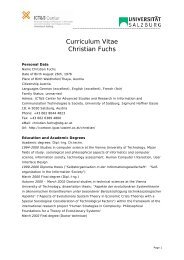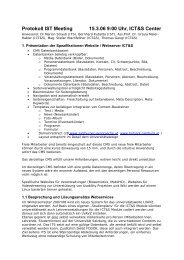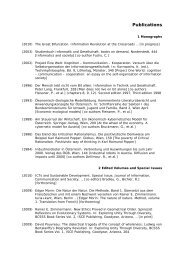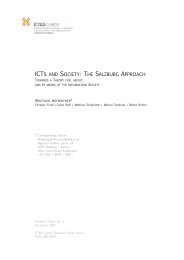CHRISTIAN FUCHS - ICT&S - Universität Salzburg
CHRISTIAN FUCHS - ICT&S - Universität Salzburg
CHRISTIAN FUCHS - ICT&S - Universität Salzburg
Create successful ePaper yourself
Turn your PDF publications into a flip-book with our unique Google optimized e-Paper software.
Christian Fuchs: Social Networking Sites and the Surveillance Societysurveillance by engaging in activities such as using the Internet, using social networkingsites, using mobile phones, leaving data traces in everyday life, etc.The most successful strategy for strengthening public discourse on an issue is to try toorganize campaigns that tackle political issues and show how citizens are immediatelynegatively affected by certain political conditions. Public campaigns can certainly havelimits, especially if there are dominant institutions and actors that have opposing viewsand have strong influence on the media and public discourse by political andeconomic power. Therefore one should not be overoptimistic concerning thepossibilities and perspectives for organizing critical discourse in a society that iseconomically and politically stratified, i.e. shaped by economic and political powerdifferentials. Nonetheless, the only way to bring about change is to try to organizecollective articulations of discontent with certain situations.Our study shows that there is a certain basic critical attitude towards surveillance bystudents. Students tend to be the most critical citizens in a society. It is certainly a limitthat we do not know more about the attitudes towards and knowledge aboutsurveillance of non-students. We cannot draw inferences from students’ consciousnessand knowledge to the rest of the population. It is a task for future research to find outmore about knowledge about and critical awareness of surveillance of citizens whohave a non-student status.(5) How does the degree of knowledge about surveillance and the degree of criticalconsciousness on surveillance influence the usage of social networking sites?88.3% of the respondents in our survey use studiVZ, 39.5% Facebook, and 15.9%MySpace. This shows that the situation of the usage of social networking sites isdifferent in German-speaking countries than in other parts of the world. studiVZ is thedominant actor and therefore tends to concentrate a large amount of the economicprofits derived from social networking sites in Austria and Europe. This concentrationprocess also gives studiVZ a huge degree of power and control over personal data.On average, 88.7% of the studiVZ users in our survey know what the corporation isallowed to do and not to do with their data. 50.5% of the MySpace users in our surveyhave a high or good degree of knowledge about the platform. In the case of Facebook,only 34.1% of the users in our survey have a good or high degree of knowledge aboutFacebook.On average, 67.4% have opted out of advertising options on studiVZ, 35.9% opted outof these options on Facebook, and 22.6% opted out of such options on MySpace. Theplatforms provide such options to different degrees and with different accessibility andusability. Table 21 summarizes the rights and opt-out options of the social networkingcorporations in our study. On Facebook, it is not possible to opt out of personalizedadvertising. On MySpace, opting out of personalized advertising and sharing of datawith advertising clients is possible, but is almost impossible to find these optionsbecause they cannot be accessed in the standard settings, but only by links that onefinds in the privacy policy. This might explain the low degree of deactivated advertisingoptions in the case of MySpace.101









